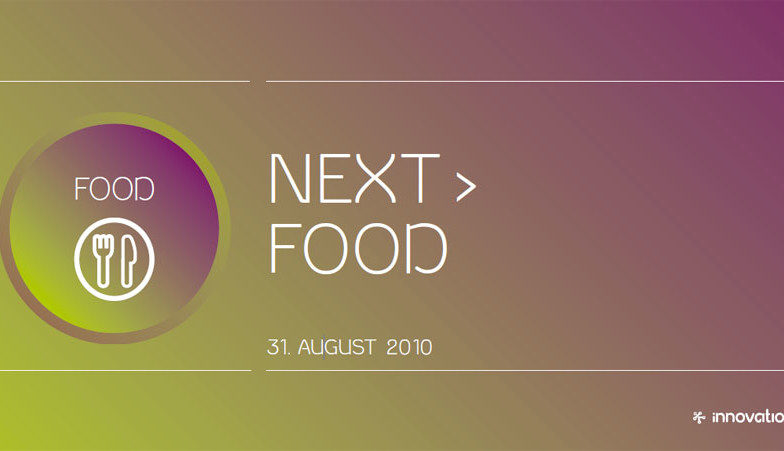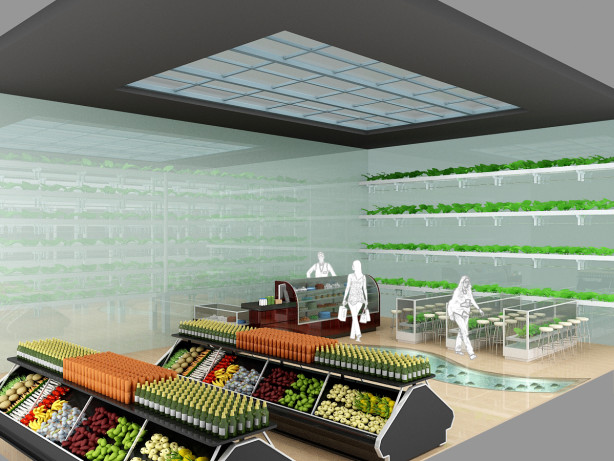NEXT Day 2: Food
August 31, 2010
on
on

After an inspiring breakfast with some of the keynote speakers and the Innovation Lab Agents, day 2 of the NEXT conference commenced. Theme of the day: Food. There are a lot of problems and questions that arise when thinking about the future of food and how we feed ourselves. The world's population will almost double over the next 50 years and there simply won't be any space left to grow and produce the food if we would stick to our currents methods. Hunger is still one of the major challenges humans face and new challenges such as obesity are just peeking around the corner. In fact, just this year the number of obese people outgrew the number of people who are underfed. Producing food locally is another challenge we're facing. Holland for instance still imports tomatoes from the United States and at the same time exports local grown tomatoes right back out. Even though many of us are aware of these problems, it seems difficult to break old habits. On this second day of NEXT the invited speakers elaborated on this subject and brought forward some refreshing ideas and insights.
Rob Nail of the Singularity University based in the Unites States worked with a group of talented students and professionals in an attempt to tackle some of these problems. The assignment for the students was simple; come up with a plan that will have a positive impact on one billion people. A group of six was given the assignment to think about the future of food and food production. These were the facts they were presented with:
"Food subjugates the earth. There is 38% of the world’s surface devoted to agriculture, and crops consume 87% of water used globally. The poorest people do not combat just starvation but obesity due to widespread malnutrition. Food miles and bacterial contamination dominate the news. The public has become suspicious and fearful of commercial agriculture, causing organic food and local food movements to be created. As global warming looms, threatening to decrease photosynthesis globally and reduce total arable land, it appears many of these problems are only going to multiply."
The team came up with a very elegant solution called AgroPolis, an urban do it yourself farm. The team has a strong believe the AgroPolis program will create a new way of producing food that uses 90% less water, 80% less space, and 100% less pesticides to grow. A way of producing food locally, where your food doesn't have to travel a single mile to get to you.
"AgroPolis is a concept for the next wave of hydroponic, aeroponic, aquaponic farming – growing vegetables without the use of soil. Initially, it will be a combined farm/restaurant/concept store, where people come to eat food they can see was grown on the premises. You walk into the store and on all the walls, and through the back wall into a room beyond, you see nothing but green – the vegetables sold in the store being grown on site. Underneath your feet you will see tilapia swimming in the aquaponics fishtank, the nutrients they process going directly to feed the plants. The store is an ecosystem unto itself. What we offer to consumers is a different experience with food. You will never have a tomato fresher than one you just saw being picked, or a lettuce more local than one where you stand next to the room in which it was grown. That is the value we offer."
Rob Nail explained that the project was built on five sustainable pillars.
If an idea like AgroPolis takes off, the concept could be easily converted to a direct consumer product. It seems the day we can grow our own tomatoes and other vegetables in a matter of hours, without sunlight, without soil, isn't very far away. We're moving into an era of truly sustainable food production. One that is local, efficient and cheap. Thanks to the bright minds of Singularity :)
Tomorrow will be another exciting day which will be all about the 'Digital'. Make sure to follow us on Twitter to stay updated on the conference throughout the day.
Day 1 of the conference: Careware
Day 3 of the conference: Digital
Rob Nail of the Singularity University based in the Unites States worked with a group of talented students and professionals in an attempt to tackle some of these problems. The assignment for the students was simple; come up with a plan that will have a positive impact on one billion people. A group of six was given the assignment to think about the future of food and food production. These were the facts they were presented with:
"Food subjugates the earth. There is 38% of the world’s surface devoted to agriculture, and crops consume 87% of water used globally. The poorest people do not combat just starvation but obesity due to widespread malnutrition. Food miles and bacterial contamination dominate the news. The public has become suspicious and fearful of commercial agriculture, causing organic food and local food movements to be created. As global warming looms, threatening to decrease photosynthesis globally and reduce total arable land, it appears many of these problems are only going to multiply."
The team came up with a very elegant solution called AgroPolis, an urban do it yourself farm. The team has a strong believe the AgroPolis program will create a new way of producing food that uses 90% less water, 80% less space, and 100% less pesticides to grow. A way of producing food locally, where your food doesn't have to travel a single mile to get to you.

"AgroPolis is a concept for the next wave of hydroponic, aeroponic, aquaponic farming – growing vegetables without the use of soil. Initially, it will be a combined farm/restaurant/concept store, where people come to eat food they can see was grown on the premises. You walk into the store and on all the walls, and through the back wall into a room beyond, you see nothing but green – the vegetables sold in the store being grown on site. Underneath your feet you will see tilapia swimming in the aquaponics fishtank, the nutrients they process going directly to feed the plants. The store is an ecosystem unto itself. What we offer to consumers is a different experience with food. You will never have a tomato fresher than one you just saw being picked, or a lettuce more local than one where you stand next to the room in which it was grown. That is the value we offer."
Rob Nail explained that the project was built on five sustainable pillars.
- Local food production
- Food is grown in a contained environment
- Cheaper diagnostics
- Genetic engineering
- Custom grown
If an idea like AgroPolis takes off, the concept could be easily converted to a direct consumer product. It seems the day we can grow our own tomatoes and other vegetables in a matter of hours, without sunlight, without soil, isn't very far away. We're moving into an era of truly sustainable food production. One that is local, efficient and cheap. Thanks to the bright minds of Singularity :)
Tomorrow will be another exciting day which will be all about the 'Digital'. Make sure to follow us on Twitter to stay updated on the conference throughout the day.
Day 1 of the conference: Careware
Day 3 of the conference: Digital
Read full article
Hide full article


Discussion (3 comments)